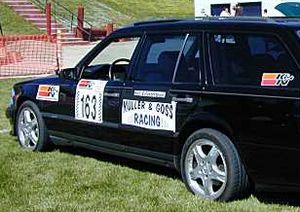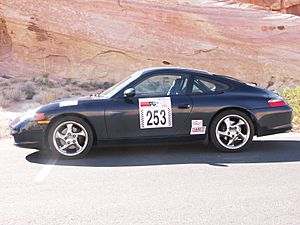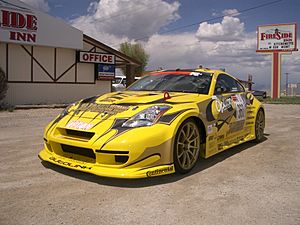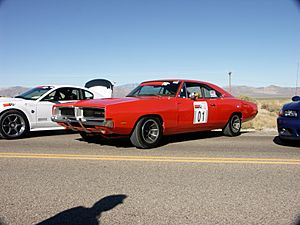Silver State Classic Challenge facts for kids
The Silver State Classic Challenge is an exciting car race held on a long, straight road in Nevada, United States. Since 1988, this special event closes a 90 mi (140 km) stretch of State Route 318 just for the race. It's known as one of the fastest road races in the world!
In 2017, Robert Allyn and David Bauer set an amazing record, averaging 219.643 mph (353.481 km/h) in a 2001 Chevrolet Monte Carlo, a type of car used in NASCAR races. While super-fast race cars get a lot of attention, most people race in regular street cars. These cars aim for average speeds between 95 to 155 mph (153 to 249 km/h). You can see all kinds of cars, from speedy Corvettes and Mustangs to Nissan Skylines, Mercedes wagons, and even Saturns.
Contents
How the Race Started
The idea for the Silver State Classic Challenge came from Steve Waldman. The very first race happened on September 25, 1988. It was originally a way to show off cool old cars. With help from the White Pine Chamber of Commerce and the Nevada Department of Transportation, the 90 mi (140 km) road was closed, and about fifty cars took part.
The next year, in 1989, a 19-year-old driver named R. J. Gottlieb set a new record. He drove a special 1969 Chevrolet Camaro Z-28 at 197.99 mph (318.63 km/h)! Over the years, the race became much more organized. Rules for safety, how cars should be prepared, and driver experience became much stricter.
Since 1991, another race called the Nevada Open Road Challenge has been held every May. It uses the same rules but on a shorter 60 mi (97 km) course. Drivers race it once in each direction, and they can even switch places with their navigators during a break.
Race Rules and Speed Groups
Drivers, and sometimes a navigator, try to drive the 90-mile (140 km) course at a specific average speed, called their "Target Speed." A GPS clock records when each car starts and finishes. The average speed is then calculated from the time it took. The winners in each speed group are the team closest to their chosen target speed.
There are four main groups, each with smaller categories. Drivers must aim for target speeds between 95 and 180 mph (153 and 290 km/h). Each group has rules about the safety gear needed for cars, drivers, and navigators. There's also a maximum "Tech Speed" that cars can never go over. Hidden radar traps are along the course to make sure everyone follows this rule. There's also an Unlimited Class where drivers just try to go as fast as possible, with no speed limits!
Touring Class: Getting Started
- Speed classes: 95, 100, 105, 110 mph
This group is for regular street cars with standard 3-point seatbelts. Drivers need a small fire extinguisher in the car, plus gloves and special Snell-approved helmets. If it's your first time racing, you usually start in this class unless you have lots of other racing experience. Cars in this class can never go faster than 124 mph (200 km/h).
Grand Touring Class: More Speed, More Safety
- Speed classes: 115, 120, 125 mph
Besides a fire extinguisher, gloves, and Snell helmets, cars in this group must have 5-point or 6-point safety harnesses. Since 2007, drivers and navigators also need window nets or arm restraints. Open-top cars (like convertibles) must have a rollbar for safety. Cars in this class can't go over 140 mph (230 km/h).
Grand Sport Class: Serious Racing Gear
- Speed classes: 130, 135, 140, 145, 150, 155 mph
In addition to all the gear from the Grand Touring class, all cars here must have a rollbar or similar rollover protection. Drivers and navigators must wear fireproof racing suits. The maximum speed for this class is 165 mph (266 km/h).
Super Sport Class: For Race Cars
- Speed classes: 160, 170, 180 mph, and Unlimited
This class is for special race cars. They need a full roll cage, a special fuel tank (called a fuel cell), and a built-in fire extinguisher system. Cars in the 160 and 170 mph (260 and 270 km/h) speed classes can't go faster than 180 mph (290 km/h). Cars in the 180 mph (290 km/h) and Unlimited classes have no specific top speed limit.
Other Fun Events
During the race weekend, there are also two drag events on a closed-off highway. Because the town of Ely is 6,400 ft (2,000 m) high, engines don't have as much power, so the speeds are a bit slower than at lower places.
The Z1Z/Z2Z Challenge
On Friday, there's the Z1Z/Z2Z challenge. In this event, drivers try to speed up from a stop to 100 mph (160 km/h) (called "Z1Z," held in May) or 200 mph (320 km/h) (called "Z2Z," held in September). Then, they have to stop as quickly as possible. Cars are grouped by their engine size. In May 2007, the fastest car took only 16.1 seconds and 1,289 ft (393 m) to reach 100 mph (160 km/h) and stop again.
The High Noon Shootout
On Saturday, the High Noon Shootout is a pure speed event. Touring and Grand Touring cars have half a mile to reach their highest speed. Grand Sports cars and faster have a full one-mile (1.6 km) straight. In May 2007, a modified Dodge Viper set a new record of 202 mph (325 km/h). Later that year, in September 2007, Mike Reichen raised the record to 212 mph (341 km/h) in a special 1994 Evo II.
Keeping Everyone Safe
Because there are no crash barriers, spectators are not allowed to watch the race. The only way to see it is by being one of the safety marshals who are stationed at every gate along the course.
There have been some serious accidents in the past. Because of this, safety rules have become much stricter in recent years. A lot of attention is now paid to the speed and strength of the tires. The radio system used by marshals to check on cars and call for help has also been greatly improved. Now, every racer even gets a basic 2-way radio to use.
Who Runs the Race
The Silver State Classic Challenge was started by Steve Waldman, who was also a regular racer. After Mr. Waldman passed away in 2014, a board of directors and other officers took over running the event. They handle everything from money matters to helping new drivers.
Famous People Who Have Raced
One well-known participant is Daijiro Inada, who started the Japanese car magazine Option. He's famous in the world of imported cars and drifting. His video magazine, Video Option, filmed his attempts at the race. His current car, the Option Stream Z, is an unlimited category Nissan 350Z.
Another famous person who has raced is John Schneider, known for his role in The Dukes of Hazzard. He has raced several times in the famous General Lee.
Jeff Allen, from TV shows like CNBC's The Car Chasers, raced in 2015 and 2016 with his custom GTR called #Pennzilla. He won several awards in 2016, including "Hooker Award," "Most Beautiful Car," and "Fastest Car" in the Half-mile shootout.
Jeff Schwartz, a car builder, won the 2006 Silver State Classic Challenge 0-200 mph-0 (Z2Z) in his homemade Ultima GTR. He also set a record for the fastest 0-100-0 time.
Guy Martin, a TV personality, raced a Ford Transit van in the 2016 Open Road Challenge. This was even shown in his TV series Speed with Guy Martin.
Cool Cars in the Race
Big Red Camaro
"Big Red" is a very famous muscle car. It was the first car to set a record in the Unlimited class of the Silver State Classic. R. J. and Dan Gottlieb built the car in 1987 using a 1969 Chevrolet Camaro. It had a powerful 540 cubic inch Chevrolet V8 engine that made 800 horsepower! R. J. and his team set the Unlimited class record at 197.99 mph (318.63 km/h). The original car was later damaged in another race. A second "Big Red" was built with a special tube chassis. After being retired to a museum in 1996, "Big Red" was brought back for racing in 2004 after a full rebuild.
Other Similar Races
There are two other similar Open Road Racing events in the U.S. The Big Bend Open Road Racing event happens in West Texas every April, and the Sandhills Open Road Challenge takes place in Arnold, Nebraska, every August.
 | Chris Smalls |
 | Fred Hampton |
 | Ralph Abernathy |





